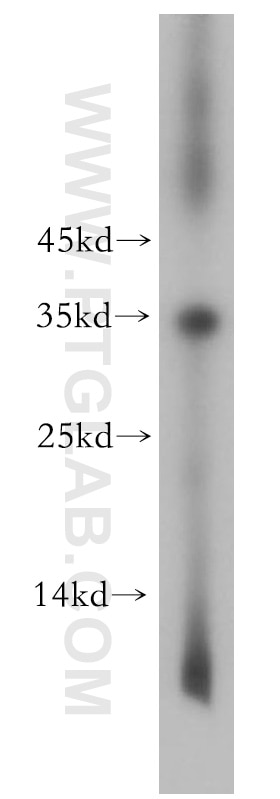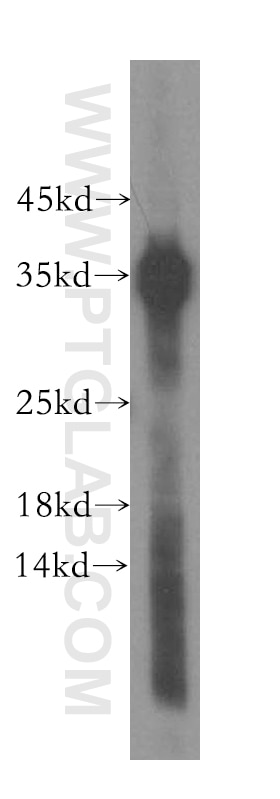TNNT1 Polyklonaler Antikörper
TNNT1 Polyklonal Antikörper für WB, ELISA
Wirt / Isotyp
Kaninchen / IgG
Getestete Reaktivität
human, Maus, Ratte und mehr (1)
Anwendung
WB, ELISA
Konjugation
Unkonjugiert
Kat-Nr. : 15893-1-AP
Synonyme
Geprüfte Anwendungen
| Erfolgreiche Detektion in WB | Maus-Skelettmuskelgewebe, humanes Skelettmuskelgewebe |
Empfohlene Verdünnung
| Anwendung | Verdünnung |
|---|---|
| Western Blot (WB) | WB : 1:1000-1:4000 |
| It is recommended that this reagent should be titrated in each testing system to obtain optimal results. | |
| Sample-dependent, check data in validation data gallery | |
Veröffentlichte Anwendungen
| WB | See 4 publications below |
Produktinformation
15893-1-AP bindet in WB, ELISA TNNT1 und zeigt Reaktivität mit human, Maus, Ratten
| Getestete Reaktivität | human, Maus, Ratte |
| In Publikationen genannte Reaktivität | human, Huhn, Maus |
| Wirt / Isotyp | Kaninchen / IgG |
| Klonalität | Polyklonal |
| Typ | Antikörper |
| Immunogen | TNNT1 fusion protein Ag8702 |
| Vollständiger Name | troponin T type 1 (skeletal, slow) |
| Berechnetes Molekulargewicht | 252aa,27 kDa; 192aa,21 kDa |
| Beobachtetes Molekulargewicht | 30-35 kDa |
| GenBank-Zugangsnummer | BC022086 |
| Gene symbol | TNNT1 |
| Gene ID (NCBI) | 7138 |
| Konjugation | Unkonjugiert |
| Form | Liquid |
| Reinigungsmethode | Antigen-Affinitätsreinigung |
| Lagerungspuffer | PBS with 0.02% sodium azide and 50% glycerol |
| Lagerungsbedingungen | Bei -20°C lagern. Nach dem Versand ein Jahr lang stabil Aliquotieren ist bei -20oC Lagerung nicht notwendig. 20ul Größen enthalten 0,1% BSA. |
Protokolle
| PRODUKTSPEZIFISCHE PROTOKOLLE | |
|---|---|
| WB protocol for TNNT1 antibody 15893-1-AP | Protokoll herunterladen |
| STANDARD-PROTOKOLLE | |
|---|---|
| Klicken Sie hier, um unsere Standardprotokolle anzuzeigen |
Publikationen
| Species | Application | Title |
|---|---|---|
J Muscle Res Cell Motil Differential regulation of Actn2 and Actn3 expression during unfolded protein response in C2C12 myotubes. | ||
Food Chem New perspective for Calpain-Mediated regulation of meat Quality: Unveiling the impact on mitochondrial pathway apoptosis in post-mortem | ||
J Integr Med Strychni Semen and its active compounds promote axon regeneration following peripheral nerve injury by suppressing myeloperoxidase in the dorsal root ganglia |



